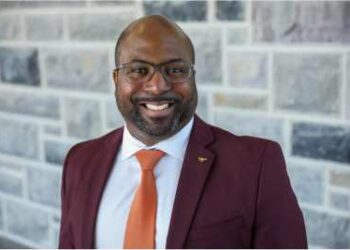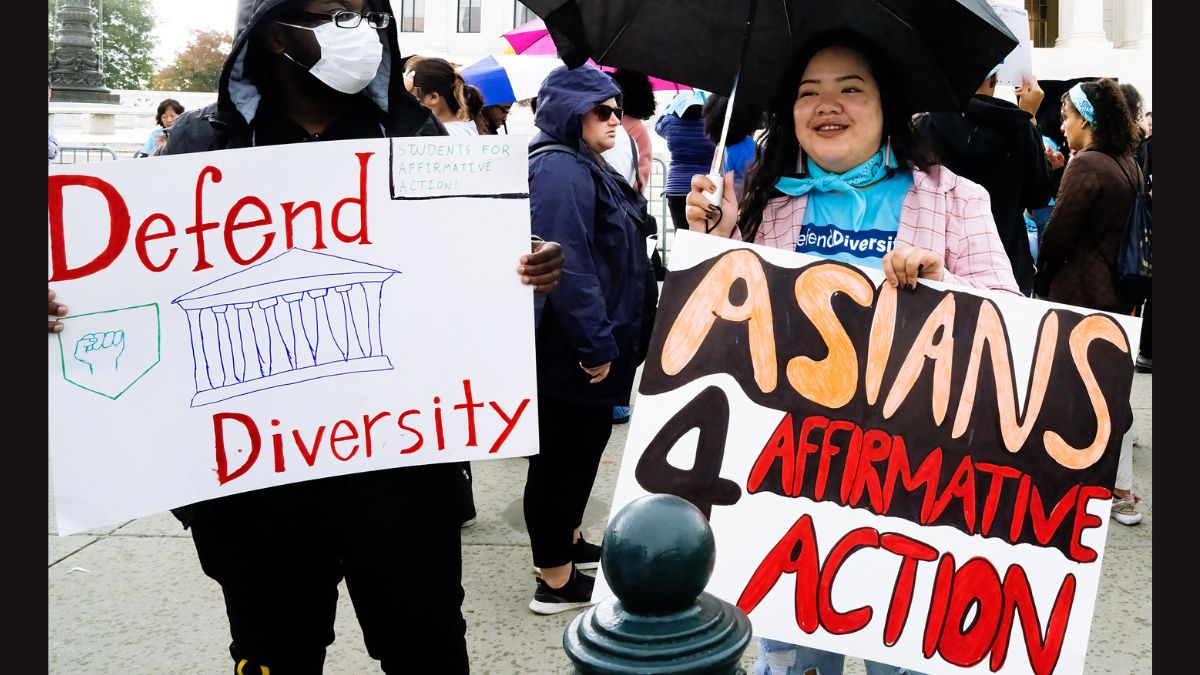Student protestors outside the Supreme Court as affirmative action cases argued inside (Photo Credit: Victoria Pickering/Flickr under a CC BY-NC-ND 2.0 license).
By James S. Bridgeforth, Ph.D.
In the landscape of American achievement, higher education has long stood as a beacon of opportunity, a powerful engine of social mobility and a cornerstone of democracy.
It is a system that predates the founding of the United States and has consistently been among the most transformative forces in society. Yet, despite its undeniable impact, higher education is under siege, targeted by an alarming wave of right-wing extremism determined to dismantle its role as a driver of progress—especially for African Americans and other marginalized groups.
At its core, American higher education is unparalleled.
For over a century, it has attracted the world’s brightest minds, educated global leaders and lifted countless families from poverty. A college degree remains one of the most effective tools for leveling the socioeconomic playing field, particularly for African Americans.
Despite these achievements, it has become a focal point for political attacks rooted in fear and exclusion.
The reasons behind these attacks are clear. Higher education, particularly for African Americans, represents a pathway to empowerment—a direct challenge to the status quo.
Today, only 14% of African Americans hold a bachelor’s degree, yet the benefits are staggering which includes, higher lifetime earnings, increased life expectancy, greater civic engagement and a broader worldview.
This empowerment is precisely what right-wing extremists fear. They recognize that education equips historically marginalized groups to ascend to positions of influence, as evidenced by the fact that African Americans have risen to the highest echelons of government, including the presidency.
Ironically, many of those leading the charge against higher education are beneficiaries of its transformative power.
Politicians decrying colleges as bastions of liberal indoctrination often hold degrees from America’s most prestigious institutions. Donald Trump attended the University of Pennsylvania. J.D. Vance graduated from Yale. Elise Stefanik graduated from Harvard and Ted Cruz boasts a degree from Harvard and Princeton. These leaders are products of the very system they seek to undermine, leveraging its advantages while striving to restrict access to others.
Why the hypocrisy? The answer is simple: preserving power.
By attacking diversity, inclusion, and equity initiatives—tools that help level the playing field—these extremists aim to stifle the upward mobility of African Americans and other marginalized communities.
The assault on higher education is not merely about curriculum or ideology; it is a broader attempt to silence progress and maintain systemic inequalities.
The Consequences of Political Interference
The impact of political interference in American higher education is profound.
More than 15 states have introduced or passed laws banning diversity initiatives dictating what can and cannot be taught, the ripple effects extend far beyond campus walls.
Faculty members face censorship, students encounter restrictions on free expression and administrators tread cautiously to avoid political retribution. This climate stifles the intellectual freedom that is the hallmark of higher education, replacing it with fear and conformity.
Moreover, these attacks disproportionately harm African-American students, who already face significant barriers to higher education. Restricting access to knowledge and opportunity undermines not only individual aspirations but also the collective progress of a nation that thrives on innovation and diversity.
The Path Forward: Resistance and Reform
To counter these assaults, higher education must embrace a proactive and united front. Faculty, students, and administrators each have a role to play in defending the integrity of America’s colleges and universities.
- Faculty must reclaim their right to academic freedom, resisting efforts to sanitize or suppress controversial ideas. Teaching truth, fostering debate and advancing knowledge are non-negotiable components of their mission.
- Students must demand that public institutions remain free from state-imposed ideologies and policies designed to dilute the value of their education. Their voices are powerful, capable of influencing state governments and pushing back against legislation that seeks to limit equality.
- Administrators must lead with courage. Colleges and universities are not political pawns but engines of progress. It is time for higher education leaders to leverage their resources, donors and private funding to fight back. Institutions should establish think tanks, hire lobbyists and launch public campaigns to protect their missions.
A Call to Action
The stakes could not be higher.
The erosion of higher education is not just an attack on campuses; it is an attack on the very fabric of American democracy.
As a nation, we must reject the false narratives that seek to divide and degrade. Instead we should champion the transformative power of education for all.
African Americans have fought too long and hard for access to the halls of higher learning to let political extremism turn back the clock.
The battle for social mobility and equality must be waged in classrooms, statehouses and communities nationwide. Higher education is not just a privilege; it is a right—and a powerful catalyst for the progress that defines us as a nation.
Let us not falter in its defense. The future of equity, opportunity and the American dream depends on it.

Bridgeforth enjoys writing as a political columnist who is a passionate advocate for justice and equality whose academic journey reflects a profound commitment to these ideals. With a bachelor’s degree in Sociology from Catawba College, Bridgeforth began his quest to understand and address systemic inequalities. He furthered his expertise with a master’s degree in Higher Education Administration from The University of Massachusetts-Amherst, followed by a Ph.D. in Higher Education Administration and Institutional Research from The University of Southern Mississippi.
Beyond his impressive academic credentials, Bridgeforth is deeply involved in organizations dedicated to empowerment and community service, including Alpha Phi Alpha Fraternity, Inc. and 100 Black Men of America. His columns provide insightful commentary on equal opportunity, social justice, economic equity, and higher education, driven by a sincere desire to amplify voices and champion the causes of those often marginalized.
Through his writing, Bridgeforth brings a blend of scholarly rigor and heartfelt advocacy, aiming to inspire change and foster a more just society for all.




